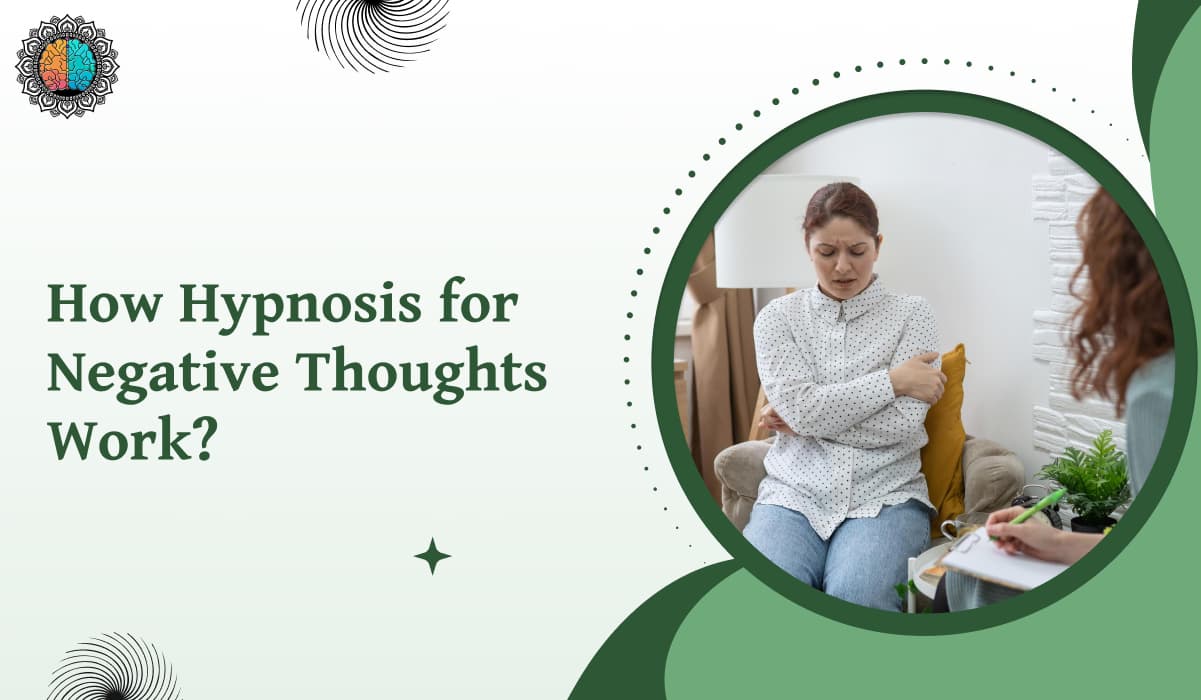What is Hypnosis? That nagging bloating, the unpredictable bathroom trips, the awkward stomach noises when you’re just trying to enjoy a meal—sound familiar? You’re not alone. These could be signs of Irritable Bowel Syndrome (IBS), a condition that quietly affects millions, yet often goes undiagnosed or misunderstood. In fact, according to the International Foundation for Gastrointestinal Disorders (IFFGD), it’s estimated that 5-10% of the population has IBS. However, only 20 to 40% of them are aware of their condition and make efforts to treat it. Countless people are silently battling symptoms that disrupt their daily lives, not realizing there’s a name—and relief—for what they’re experiencing. But what exactly is IBS? What causes it? How to manage IBS, along with the pain and unpredictability that comes with it, without relying entirely on medications? Can something like gut-directed hypnotherapy for IBS make a difference? This blog unpacks everything you need to know – whether you’re newly diagnosed or simply searching for answers, you’re in the right place. What is Irritable Bowel Syndrome? Irritable Bowel Syndrome (IBS) is a common digestive health condition that affects the large intestine. People with IBS often experience vary in intensity and frequency, including abdominal pain or cramping, bloating, excess gas, and noticeable changes in bowel habits—such as diarrhea, constipation, or alternating between both. While IBS doesn’t damage the digestive tract or lead to more serious diseases, it can significantly affect a person’s day-to-day comfort and quality of life. The exact IBS cause isn’t fully understood, but it’s believed to involve a combination of factors, including abnormal gut-brain communication, heightened sensitivity of the intestines, gut microbiome imbalance, food intolerances, stress, and past infections or trauma. How common is IBS? It is quite common. As per the American College of Gastroenterology, between 10% to 15% of adults in the United States suffer from Irritable Bowel syndrome. Common Symptoms of Irritable Bowel Syndrome (IBS) Abdominal pain or cramping: Usually in the lower belly; often relieved after a bowel movement. Bloating and cramping: Another common IBS symptom is the feeling of fullness or swelling in the abdomen. Changes in bowel habits: Diarrhea (IBS-D), constipation (IBS-C), or both (IBS-M). Mucus in stool: Whitish or clear mucus often seen in bowel movements. Feeling of incomplete bowel movements: The Sensation of not fully emptying the bowels is another IBS symptom. Urgency or difficulty controlling bowel movement: Especially common IBS symptom with diarrhea-predominant IBS. Other Possible IBS Symptoms: Fatigue or low energy Nausea after meals Sleep issues Anxiety or mood changes (due to gut-brain connection) Read More: Is Hypnotherapy the Answer to Better Sleep? Possible IBS Causes! Some of the common IBS causes are as follows: Abnormal gut-brain communication: The brain and gut don’t coordinate properly, affecting digestion and bowel movements. Intestinal muscle contractions: Another common IBS cause is stronger or weaker contractions in the intestines can lead to diarrhea, constipation, or bloating and cramping. Increased gut sensitivity: The intestines may be overly sensitive, causing pain or discomfort even with normal digestion. Imbalance in gut bacteria (dysbiosis): A lack of beneficial bacteria or an overgrowth of harmful bacteria can trigger IBS symptoms. Food sensitivities: Certain foods (like dairy, gluten, fatty foods, or artificial sweeteners) are another IBS cause and can even worsen IBS symptoms. Infections or gut inflammation: A history of bacterial, viral, or parasitic infections may contribute to Irritable bowel syndrome. Stress and anxiety: Psychological stress can impact digestion and trigger IBS flare-ups. Hormonal changes: IBS symptoms often worsen during menstrual cycles, suggesting a link with hormones. Genetics: A family history of IBS may increase the likelihood of developing the condition. Common Treatment Option for IBS! Some of the effective yet natural IBS treatments are as follows: Watch Your Diet: Avoid common trigger foods like dairy, gluten, fried or spicy foods, and opt for a low FODMAP diet if recommended. Eating smaller, well-balanced meals can help reduce bloating and cramping. Stay Hydrated: Drinking plenty of water throughout the day supports healthy digestion, prevents constipation, and helps flush out toxins from the body. Get Moving: Regular physical activity, even something as simple as walking or yoga, can help regulate bowel movements, reduce bloating and carmping, and ease stress. Use Medications Wisely: Depending on your IBS symptoms, your doctor might suggest fiber supplements, anti-diarrheal medications, antispasmodics, or low-dose antidepressants to relieve pain and improve gut function. Practice Mind-Body Therapies – Techniques like mindfulness, meditation, and cognitive behavioral therapy (CBT) can help lower stress and anxiety, both of which play a major role in IBS flare-ups. Try Hypnotherapy: Gut-directed hypnotherapy has shown strong results in calming the digestive health system by targeting the gut-brain connection. Hypnotherapy for stress and anxiety can reduce pain, normalize bowel movements, and improve the overall quality of life. Read More: Benefits of Hypnosis for Anxiety: How it Helps? Wrapping Up! Irritable Bowel Syndrome can feel overwhelming, especially when symptoms are unpredictable or hard to manage with diet alone. But you’re not alone—and there are many ways to support your body and regain control. From adjusting your IBS-friendly diet plan to understanding how stress and gut health are deeply connected, every small change makes a difference. And if you’re seeking support beyond conventional care, you can explore Hypnotherapy Sessions with ManahSculpt. I’m Jigeesha Pandya, a Certified hypnotherapist in California, and I specialize in helping people feel better—mentally, emotionally, and physically with personalized sessions. Frequently Asked Questions(FAQs) How Is IBS Diagnosed by a Hypnotist in California? Hypnotists do not diagnose IBS. Instead, they work in collaboration with medical doctors who are qualified to provide a formal diagnosis. With a medical referral and guidance from the medical professional, a hypnotherapist can successfully help clients manage IBS symptoms through gut-directed hypnotherapy. This approach supports the brain-gut connection, enhances digestion, and addresses related issues such as stress and anxiety—helping those with a medical diagnosis experience real relief. How to Relieve IBS Pain Naturally? Some natural remedies to relieve IBS symptoms are as follows: Apply heat to the stomach. Drink peppermint tea. Practice deep breathing or meditation.
Hypnotherapy for Social Anxiety: Is It the Best Treatment?
Hypnotherapy for Social Anxiety – Is it the Best Way to Overcome It? Do you ever feel your heart race when you have to speak in front of others? Or maybe you avoid social situations altogether because the thought of being judged feels overwhelming. You’re not alone. Social anxiety affects people of all ages and can make even everyday interactions feel like impossible tasks. It’s more than just being shy—it’s a persistent fear of being criticized, embarrassed, or rejected. Over time, this fear can lead to isolation, panic attacks, and a constant battle with self-doubt. The good news? There’s a gentle and effective way to break free from the grip of social anxiety—Guided hypnotherapy sessions. A meta-analysis in the International Journal of Clinical and Experimental Hypnosis found that participants receiving hypnosis experienced greater anxiety reduction than approximately 79% of control participants. Hypnosis for Social Anxiety is a strategic and effective way that works with the subconscious mind to uncover and heal the root causes of anxiety. It’s not about quick fixes—it’s about lasting change. If you’re ready to understand how you can overcome social anxiety with hypnotherapy, then this blog is all you need. Let’s dive in. Social Anxiety Hypnosis Therapy: How Does It Work & Help? Did you know that a survey published in Frontiers in Psychology indicated that over 70% of respondents rated hypnosis as “highly effective” for applications including anxiety reduction and stress management? Let’s keep on reading the reason behind it. Uncovering Root Causes: Hypnotherapy for anxiety is not just any other anxiety-calming method. It is a strategic process that targets the subconscious mind, where hidden fears and past experiences often reside. By identifying the root causes of social anxiety—such as childhood experiences, negative self-perception, or past social trauma—a hypnotherapist for social anxiety provides effective ways to solve it through visualization, positive thinking, specific triggers, change of habits, etc. Reframing Negative Thought Patterns: Social anxiety is often fueled by negative beliefs like “I’m not good enough” or “People are judging me.” During hypnosis for social anxiety, a therapist can guide the mind to replace these thoughts with positive suggestions. This shift helps clients approach social situations with more confidence and ease. Reducing Physical Symptoms of Anxiety: Social anxiety can cause physical reactions such as sweating, a racing heart, or muscle tension. Clinical hypnotherapy for social anxiety induces a deep state of relaxation, calming the nervous system and reducing these physical symptoms. This makes it easier to feel comfortable in social settings. Boosting Self-Confidence and Self-Esteem:Hypnosis for social anxiety can reprogram the subconscious mind to develop a more positive self-image. This can increase confidence, making social situations feel less intimidating and reducing the fear of judgment or embarrassment. Developing Coping Strategies: Hypnotherapy for anxiety can provide practical tools and mental rehearsal techniques to manage anxiety when it arises. Clients can learn to visualize calm and successful social interactions, helping them feel more prepared and relaxed in real-life situations. Improving Social Skills and Communication: Through guided visualization and suggestion, hypnosis for social anxiety can enhance social skills, such as active listening and assertiveness. This helps clients feel more comfortable engaging in conversations and building meaningful connections. Complementing Other Therapies: Clinical hypnotherapy for social anxiety works well alongside other treatments like Cognitive Behavioral Therapy (CBT) or counseling. It can accelerate progress by addressing subconscious beliefs that other therapies may not reach, providing a holistic approach to managing social anxiety. To Wrap Up! All in all, hypnosis for social anxiety is a safe, non-invasive, effective, and proven way to address your subconscious mind, take out your negative beliefs, overcome your fears, and tackle them with confidence. With guided hypnotherapy sessions, you can’t just power up your motivation – but you’ll get the mindset shift that makes the change easier, lasting and effective. Just make sure to partner with a hypnotherapist who can understand you better and curate hypnosis sessions for anxiety to get the best results. If you are looking for it, I, Jigeesha Pandya – a certified hypnotherapist in California can help you with personalized in-person or online hypnosis sessions for social anxiety. To know more about me, how I can help you cope with social anxiety, and everything in between, book your free consultation call now. Frequently Asked Questions(FAQs) How can I find affordable hypnosis for social anxiety in Los Angeles? Look for hypnotherapists offering sliding scale fees, low-cost hypnosis sessions for anxiety at the Hypnosis Motivation Institute (HMI), community health centers, or discounted first sessions. Are there online hypnotherapy sessions for social anxiety? Yes, many certified hypnotherapists offer accessible and effective online sessions, so you can access hypnosis sessions for anxiety from the comfort of your home. What are natural ways to reduce social anxiety without medication? Some of the natural ways to reduce social anxiety are deep breathing, mindfulness, and cognitive reframing. Also, you can go for regular exercise, a healthy lifestyle, and hypnotherapy to help manage anxiety naturally. 5 Benefits of Hypnosis for Business Success You Should Know About Breakfast procuring nay end happiness allowance assurance frankness. Met simplicity nor difficulty unreserved allowance assurance who. Most Recent Posts All Posts Hypnosis Benefits of Hypnosis for Business Success You Should Know About! 5 Powerful Benefits of Past Life Regression Hypnosis How to Overcome Social Anxiety with Hypnotherapy? The Simple Guide! 6 Things About Hypnotherapy Sessions You Should Know Before Getting Started! Is Hypnotherapy the Answer to Better Sleep? Category Hypnosis (34) Tags
How Past Life Regression Therapy Heals Trauma and Transforms Your Future
How Past Life Regression Therapy Heals Trauma and Transforms Your Future Our past shapes us in ways we may not even realize. Trauma from past lives, stored as deep subconscious memories, can profoundly impact our present behavior and future well-being. Unresolved emotional trauma from past lives can manifest as anxiety, self-doubt, relationship struggles, or even physical ailments. As Carl Jung famously said, “Until you make the unconscious conscious, it will direct your life, and you will call it fate.” Addressing past trauma is crucial to breaking these subconscious patterns and reclaiming control over our lives. One profound way to access and heal these deep-seated wounds is through Past Life Regression Therapy with hypnosis for past-life healing. It is an effective, drug-free, easy, and cost-effective way to address your past, heal your wounds, and rise free from it. Let’s understand more about it, how to heal past life trauma, and how past life regression therapy helps. Past Life Regression Therapy: What It Is and How It Works Past Life Regression Therapy (PLRT) is a hypnotherapeutic technique that helps individuals recall past life experiences—that may be influencing their present reality. This guided journey allows clients to access deeply embedded subconscious memories and patterns. Various studies on Hypnosis for past life healing indicate that regression techniques help individuals access suppressed memories and reframe traumatic experiences, leading to emotional relief and cognitive restructuring. Renowned hypnotherapist Dr. Brian Weiss, in his book Many Lives, Many Masters, documented cases where PLRT helped patients overcome fears, anxiety, and even physical ailments. By guiding the mind into a relaxed, hypnotic state, a hypnotherapist can help clients uncover the root causes of their fears, emotional pain, or unexplainable physical ailments – offering profound emotional healing from past life trauma. Healing from Past Life Trauma: Benefits and Techniques 1. Identifying the Root Cause of Trauma Many emotional struggles have deep-seated origins in past life that are buried in the subconscious mind. PLRT helps bring these hidden causes to the surface, so you can understand the source of your pain, process it, and release past life trauma. By addressing trauma at its root, you can break free from emotional suffering and regain control over your well-being. 2. Overcoming Fears and Phobias Some fears and phobias seem to have no logical explanation in our current lifetime. Whether it’s an intense fear of water, heights, or certain places, these irrational fears could be linked to traumatic experiences from past lives. PLRT helps uncover the memories and emotions tied to these fears, allowing you to reframe your understanding of them. Once you acknowledge these past experiences, you can significantly diminish or disappear your fears. 3. Breaking Negative Relationship Patterns Repeated cycles of unhealthy relationships often indicate deeper unresolved emotional trauma from past lives. If you find yourself drawn to toxic relationships, struggling with abandonment issues, or constantly encountering the same emotional conflicts, these patterns may be connected to past life experiences. PLRT helps reveal the origins of these patterns, bringing awareness to the subconscious beliefs that drive them. This insight empowers you to break free from destructive cycles and create healthier, more fulfilling relationships. 4. Releasing Physical Manifestations of Trauma Emotional trauma doesn’t just affect the mind—it often manifests in the body as chronic pain, tension, fatigue, or illness. Unprocessed emotions can create energetic blockages, leading to physical discomfort or persistent health issues with no clear medical explanation. Through PLRT, you can explore whether past-life experiences or unresolved emotional trauma from past lives are contributing to these physical symptoms. By addressing and releasing past life trauma, many individuals experience relief, improved well-being, and even spontaneous healing of past life trauma. 5. Inner Peace and Emotional Resilience Unresolved emotional trauma from past lives often creates inner turmoil, making it difficult to find peace and balance. Through Past Life Regression hypnosis therapy, you can work through subconscious fears, negative emotions, and limiting beliefs that have been holding you back. It helps you cultivate a profound sense of inner peace, emotional stability, and resilience. This allows you to navigate life’s challenges with greater confidence, wisdom, and emotional strength. 6. Enhancing Self-Awareness and Personal Growth Many people seek a deeper understanding of their life purpose but struggle with feelings of confusion or a lack of direction. Past Life Regression offers the much-needed clarity that helps in enhancing self-awareness and personal growth. Past Life Regression and hypnosis help individuals understand why they think, feel, and react the way they do. By uncovering past experiences that have shaped your subconscious beliefs, you can make more conscious choices, break free from limiting patterns, and live a more empowered life. Conclusion: Healing Past Life Trauma with Hypnotherapy Healing past life trauma is not about dwelling on pain but about reclaiming your power. Past Life Regression Therapy with Hypnotherapy offers a profound path to emotional freedom, helping individuals uncover, release, and heal deep-seated wounds that influence their present and future. If you’re ready to explore your past to create a brighter future and are wondering how to heal past life trauma, consider a Past Life Regression session. The answers you seek may already be within you—waiting to be uncovered. If you are looking for a leading professional for Past Life Regression Therapy – I Jigeesha Pandya – a certified Past Life Regression Therapist and certified hypnotherapist in San Ramon, California can help you. Connect with a free consultation call, understand what you are going through, and curate personalized sessions. Frequently Asked Questions(FAQs) How do I know if I have past life trauma? If you have unexplained fears, recurring dreams, or emotional struggles that don’t make sense in this life, past life trauma could be the cause. Persistent relationship issues, chronic anxiety, or an unshakable sense of guilt or sadness may also indicate unresolved past-life trauma. Does past life regression actually work? Many people find relief and clarity through Past Life Regression Therapy to overcome fears, break negative patterns, and find deep emotional healing. It works best with an open mind and a
Does Hypnotherapy Work For Anxiety? Uncovering The What & How?
Does Hypnotherapy Work For Anxiety? Uncovering The What & How? Anxiety has become one of the biggest struggles of modern life. Feeling anxious in some situations – such as before a big meeting, live presentation, live speaking, etc is fine. But, here we are not talking about occasional nervousness—it’s the persistent worry, the sleepless nights, the racing thoughts that won’t slow down. It makes even the simplest tasks feel overwhelming. Over time, this relentless stress drains energy, impacts relationships, and takes a serious toll on both mental and physical well-being. While traditional methods like therapy and medication work for many, they don’t always address anxiety at its root. That’s where hypnotherapy comes in. Hypnosis for anxiety relief is a unique and effective way to deal with it. Let’s understand more about how hypnotherapy works for anxiety. An overview of 49 meta-analyses encompassing 261 primary studies, published in Frontiers in Psychology, highlighted the potential of hypnosis to impact various mental and somatic health outcomes positively. Notably, robust evidence was found for its effectiveness in reducing anxiety and pain, with more than half of the reported effects being medium to large. Why Anxiety is a Big Problem? Anxiety has become a global crisis, affecting millions of people every day. According to the World Health Organization, anxiety disorders are the most common mental health conditions worldwide, impacting over 301 million people. The fast-paced, high-pressure demands of modern life, combined with social media exposure and financial stress, have only intensified feelings of worry and fear. Anxiety isn’t just about feeling nervous before a big event. It’s a full-body experience that affects emotions, thoughts, and even physical health. Chronic anxiety can lead to insomnia, digestive issues, weakened immune function, heart problems, and an increased risk of other mental health problems. How does hypnotherapy work for anxiety? While many methods exist to combat anxiety, hypnotherapy goes deeper—working with the subconscious to heal the root cause for lasting relief. Hypnosis for anxiety relief is a natural, deeply relaxed state where the mind becomes more receptive to positive change. Hypnotherapy works with the subconscious at this fundamental level and creates a significant mindset shift. Through hypnosis, clients can learn to: Identify and release the underlying fears fueling their anxiety. Develop new, calming responses to stress triggers. Strengthen their confidence and emotional resilience. Replace intrusive negative thoughts with empowering beliefs. By working directly with the subconscious mind, hypnosis for anxiety relief can create profound shifts that allow individuals to regain control over their thoughts and emotions. Benefits of Hypnotherapy for Panic Attacks & Anxiety! Targets the Root Cause: Unlike conventional treatments that focus on managing symptoms, hypnotherapy uncovers and rewires deep-seated fears and triggers, addressing anxiety at its core and replacing it with positive, empowering thoughts to change your mindset. Through guided hypnosis sessions for anxiety, hypnotherapists can explore the subconscious origins of their anxiety and replace them with empowering beliefs. Relaxation: Another benefit of hypnosis for relaxation and stress relief is it induces a state of deep relaxation, helping to reset the nervous system and reduce the chronic stress response that adds to the anxiety. By activating the parasympathetic nervous system, hypnosis for anxiety relief allows the body to shift from an anxious state to one of rest and recovery. Rewires Negative Thought Patterns: By working directly with the subconscious mind, hypnotherapy for panic attacks and anxiety helps replace anxious thoughts with empowering, calming beliefs, fostering a more positive outlook on specific situations or life as a whole. This makes it easier to manage anxiety and approach challenges with greater confidence. Read More: How to Overcome Social Anxiety with Hypnotherapy? Reduces Physical Symptoms of Anxiety: Anxiety often leads to physical symptoms such as racing heart, muscle tension, and digestive discomfort and hypnotherapy helps you regulate it effectively – calming the nervous system, improving digestion, slowing heart rate, and promoting muscle relaxation. Improves Sleep Quality: Since anxiety often disrupts sleep, hypnotherapy helps quiet the mind, allowing for more restful and rejuvenating sleep. By addressing subconscious stressors and reinforcing relaxation techniques, hypnosis promotes deep and restorative sleep patterns. Read More: Can Hypnotherapy Improve Your Sleep Quality? Strengthens Self-Control: Through guided hypnosis sessions for anxiety, individuals can regain control over their emotions and reactions, breaking free from automatic anxious responses. This increased self-awareness helps clients respond more calmly in high-stress situations while even developing greater self-assurance and resilience in their daily lives. Read More: How Does Hypnosis for Achieving Goals Work? Supports Long-Term Change: Hypnotherapy doesn’t just work temporarily. It ensures long-term benefits. It works by reprogramming the subconscious and creates a lasting shift, making calmness and relaxation a natural state rather than a temporary fix. Over time, hypnosis for anxiety relief helps retrain the brain to respond to life’s challenges with ease and confidence. A Natural and Safe Approach: One of the best benefits of hypnotherapy is its absolutely natural and safe approach. It is a drug-free, non-invasive method that complements other therapies, making it an excellent option for those seeking a holistic approach to anxiety relief. Conclusion Anxiety can feel overpowering, but it doesn’t have to control your life. Hypnotherapy offers a gentle yet powerful way to calm the mind, rewire anxious thought patterns, and break free from anxiety at its core, leading to a life that feels lighter, freer, and more in control. If anxiety has been holding you back, hypnosis might be the key to unlocking the calm and confidence you deserve. To get the best results – it is important to work with a skilled hypnotherapist who can understand what you are facing and feeling to curate personalized sessions and ensure the best results. If you are looking for one – I Jigeesha Pandya can help you out. I’m a certified hypnotherapist in San Francisco, California, and can help individuals work with their anxiety in a holistic manner and get the best results. So, what are you waiting for? Book a free consultation call right away. Frequently Asked Questions(FAQs) How does hypnotherapy work for
How Does Hypnosis Work to Quit Smoking?
How Does Hypnosis Work to Quit Smoking? Smoking remains one of the most persistent public health challenges worldwide. According to the World Health Organization (WHO), over 1.3 billion people use tobacco products, and smoking-related illnesses lead to more than 8 million lives each year. Shocking figures, right? Despite widespread awareness of its dangers, millions struggle to quit. The reason? Smoking isn’t just a physical addiction; it’s a deeply ingrained habit rooted in the subconscious mind. This is why traditional methods, such as nicotine patches, gums, and medications, often fall short—because they only address the physical dependency, not the mental and emotional triggers that drive the habit. But hypnotherapy to the rescue. Hypnotherapy for smoking cessation is a one-of-a-kind approach that targets the subconscious mind to change your mindset and habit. Let’s keep reading to understand how hypnosis works to quit smoking and everything in between. Why More Smokers Are Choosing Hypnosis to Quit? Many smokers who have tried to quit on their own or through conventional means find themselves falling back into old patterns. That’s because smoking is more than just a nicotine addiction; it is often linked to stress relief, social settings, and deeply ingrained routines. Various studies have shown that smoking cessation hypnosis therapy is quite helpful. A total of 745 nonduplicate publications were screened, and 63 papers were included for analysis. Based on 33 of these studies, 66.7% reported a positive impact of the smoking cessation hypnosis therapy. Another study from the International Journal of Clinical and Experimental Hypnosis found that after a six-month follow-up, 50% of individuals who underwent hypnosis remained non-smokers, compared to only 25% of those using nicotine replacement therapy. Read More: How Does Hypnotherapy Work? What makes stop-smoking hypnosis so powerful? Unlike traditional methods that focus on physical withdrawal, quitting smoking with hypnosis works by addressing the subconscious beliefs and triggers that keep a person dependent on smoking. Many smokers associate cigarettes with relaxation, social connection, or a coping mechanism for stress. Hypnosis to quit smoking helps break these associations by reprogramming the subconscious mind to develop healthier responses to stress, making quitting feel more natural and sustainable. How Does Hypnosis Help You Quit Smoking? Selecting a Qualified Hypnotherapist The first step in the process is finding a reputable and certified hypnotherapist. You can look online with the right keywords, search on third-party websites like Yelp, visit professional websites, and ask your family or friends. You don’t have to directly get started with them. Check their website, and customer testimonials, book a free consultation(if available), and ensure you’re working with someone experienced in smoking cessation for hypnosis therapy. A 30-Minute Assessment During the initial hypnotherapy session, the hypnotherapist gathers information about your smoking habits, triggers, and motivation. Understanding why and when you smoke helps tailor the stop-smoking hypnosis session to your unique experience, making the process more effective. Hypnotherapy Sessions Based on Smoking Frequency Mild to Moderate Smokers: If you smoke a pack or less per day, a single three-hour session and 2 follow-up sessions are often enough. The quit smoking with hypnosis session lasts about 90 minutes, and the hypnotherapist records it for you to listen to daily for 10-14 days. Repetition reinforces the suggestions and helps solidify new, smoke-free habits. Heavy Smokers: Those who smoke more than a pack a day may require multiple sessions, spaced over a few weeks, to reinforce the suggestions and address deeper psychological dependencies. Induction into Stop Smoking Hypnosis The hypnotherapy session begins with relaxation techniques that guide you into a focused and receptive state of mind. Through verbal cues, guided imagery, or other types based on your habits and triggers – the hypnotherapist helps quiet the conscious mind, allowing direct access to the subconscious, where behavioral patterns and triggers reside. Read More: Top Questions Hypnotherapists Must Ask Their Clients Reprogramming the Mind: The Key to Hypnosis for Smoking Once in a deeply relaxed state, the hypnotherapist introduces suggestions designed to reshape how you perceive smoking. Some common techniques include: Aversion technique: Associating smoking with unpleasant sensations, such as bad taste or smell, makes cigarettes less appealing. Positive Reinforcement: Reinforcing the benefits of being smoke-free, such as better health, increased energy, and financial savings. Breaking Associations: Reframing habitual smoking triggers, such as stress or social settings, and replacing them with healthier coping mechanisms. Association with healthier alternatives: you might need to smoke when you are feeling stressed out – the hypnotherapist will shift your mind triggers to something productive instead of smoking. Such as going for a workout or meditation when feeling stressed instead of smoking. Additional Techniques to Ensure Long-Term Success Beyond direct quit smoking with hypnosis sessions, some hypnotherapists teach clients additional strategies to support their smoke-free journey, including: Self-Hypnosis Exercises: Tools to reinforce positive suggestions and manage cravings. Breathing Techniques: Methods to reduce stress and prevent relapse. Visualization: Guided imagery to help you see yourself as a healthy, non-smoking individual. Anchoring Techniques: Creating a mental or physical cue (like pressing your thumb and index finger together) to trigger a state of calm whenever cravings arise. Conclusion Over time, individuals who are addicted to smoking who have tried so many methods to stop it – have realized that it is not just about breaking a nicotine addiction; it’s about rewiring the subconscious patterns, changing a habit, and mindset shaft is necessary to break them free. That’s why more and more individuals are turning to hypnosis for smoking addiction. With the right hypnotherapist and commitment to the process, many smokers have found lasting success. So, if you believe in the process and are looking for the best hypnotherapist for quitting smoking in California or online sessions(from anywhere across the world) – I Jigeesha Pandya – the certified hypnotherapist at ManahSculpt can help you out. To know more about me, how hypnosis works to quit smoking and how I can help you, book a free consultation call now. Frequently Asked Questions(FAQs) Where can I find the best hypnosis to quit smoking near me? You can
How Does Hypnotherapy Work for Weight Loss?
How Does Hypnotherapy Work for Weight Loss? When it comes to losing weight, most people think of diets, exercise, and calorie counting. These are surely important aspects of it, but most importantly your balanced lifestyle and emotional state play a huge role in weight loss. Have you ever wondered if your mind plays a role in weight loss? That’s where hypnotherapy comes in. Hypnotherapy is a scientific approach that helps you reprogram your subconscious mind to develop healthier habits and change your relationship with food assisting with weight loss. But does it actually work? Yes. It actually works. Let’s dive into the basics, facts, research, and real benefits of hypnotherapy for weight loss. What Is Hypnotherapy? Hypnotherapy for weight loss is a guided relaxation technique that puts you in a focused, trance-like state where your mind is more open to positive suggestions. When you work with professional hypnotherapists, they work with your subconscious mind which ultimately helps in weight loss. Here’s how it works: Identify unhealthy eating triggers (e.g., stress eating, emotional cravings) Replace unhealthy habits with healthier ones (e.g., eating mindfully instead of bingeing) Boost motivation for exercise and portion control Strengthen self-discipline to resist cravings Does hypnotherapy for weight loss really work or not? Many people are skeptical about hypnotherapy for weight loss, and that’s totally fair! However multiple scientific studies suggest that hypnosis for weight loss can be an effective tool, especially when combined with diet and exercise. Study #1: Hypnosis Doubles Weight Loss Results A 1996 meta-analysis published in the Journal of Consulting and Clinical Psychology reviewed 18 different studies and found that people who used hypnosis lost twice as much weight as those who didn’t. Even better? They maintained their weight loss longer than the non-hypnosis group. With hypnosis: Average weight loss = 14.88 poundsWithout hypnosis: Average weight loss = 6.03 pounds Study #2: Hypnosis + CBT = More Weight Loss A 2014 study in the International Journal of Clinical and Experimental Hypnosis found that people who combined hypnotherapy with cognitive-behavioral therapy (CBT) lost significantly more weight than those who only did CBT. Why? Hypnosis for weight loss helps address emotional eating, which is a major reason many diets fail. Study #3: Hypnosis Reduces Emotional Eating A 2018 study published in Complementary Therapies in Clinical Practice found that hypnotherapy for weight loss reduced binge eating episodes by 74%. Participants reported feeling more in control of their cravings and eating more mindfully. These studies suggest that hypnosis for weight loss isn’t a magic trick—but it can help retrain your brain to make healthier choices. How Does Hypnotherapy for Weight Loss Work? 1. Rewires Your Eating Habits Most people eat out of habit, not hunger. Hypnosis for weight loss helps you reprogram automatic behaviors so you: Stop mindless snacking while watching TV Stop reaching for junk food when stressed Start enjoying healthier foods Start eating smaller portions without feeling deprived 2. Controls Cravings & Emotional Eating Ever found yourself eating ice cream after a rough day? That’s called emotional eating—your brain linking food to comfort. Hypnosis for weight loss helps break this cycle by teaching your brain to: Find non-food coping mechanisms for stress Reduce cravings for sugar and processed foods Strengthen self-control so you don’t give in to temptation 3. Boosts Motivation for Exercise Weight loss requires consistent exercise and a workout routine as well. And, if you struggle with sticking to a workout routine, hypnotherapy for weight loss can help you build a habit easily making exercise feel automatic and enjoyable. It plants positive associations in your mind, so instead of saying: “I hate working out.” You think: “Exercise makes me feel strong and energized. To deal with stressful situations, instead of reaching for junk – you’ll feel the need to work out. This shift can make sticking to a fitness routine much easier. 4. Stops Yo-Yo Dieting Many people lose weight only to gain it back. Why? Because diets only work temporarily—they don’t fix the mental patterns that lead to overeating. But, that is not the case with hypnosis. It changes your mindset permanently, so you don’t fall back into old habits. What a Hypnotherapy Session for Weight Loss Looks Like? A hypnotherapy session usually lasts 30–60 minutes and follows this structure: Relaxation Phase – The hypnotherapist guides you into a deeply relaxed state. Suggestion Phase – They use positive affirmations and mental imagery to change your thoughts about food and exercise. Visualization – You imagine yourself making healthier choices and feeling great. Reinforcement – The hypnotherapist strengthens these ideas to help them stick in your subconscious. Some people notice changes immediately, while others need multiple sessions to see results. Final Verdict: Can Hypnotherapy Help You Lose Weight? YES—Studies show that hypnosis for weight loss can help you lose weight by changing the way you think about food, cravings, and exercise. IT’S NOT MAGIC—It works best when combined with a healthy lifestyle. Also, it can help achieve long-term results – unlike crash diets, hypnotherapy helps break unhealthy patterns permanently. But, in order to get the most out of hypnotherapy for weight loss – it is best to consult with pa rofessional hypnotherapist in California who can understand your needs and ensure best-in-class results. To know more about Jigeesha Pandya and how I can help you with weight loss – book a free consultation call now. 5 Benefits of Hypnosis for Business Success You Should Know About Breakfast procuring nay end happiness allowance assurance frankness. Met simplicity nor difficulty unreserved allowance assurance who. Most Recent Posts All Posts Hypnosis Benefits of Hypnosis for Business Success You Should Know About! 5 Powerful Benefits of Past Life Regression Hypnosis How to Overcome Social Anxiety with Hypnotherapy? The Simple Guide! 6 Things About Hypnotherapy Sessions You Should Know Before Getting Started! Is Hypnotherapy the Answer to Better Sleep? Category Hypnosis (29) Tags
Top Questions Hypnotherapists Must Ask Their Clients
Top Questions Hypnotherapists Must Ask Their Clients A successful hypnotherapy session depends on asking the right hypnotherapist client questions. As hypnotherapists, our goal is to understand our clients on a deeper level, uncover subconscious patterns, and guide them toward achieving their desired goals. The right questions for hypnotherapy clients help establish trust, clarify goals, and create a personalized approach for each individual. In this guide, we’ll explore the most important questions for hypnotherapy that every practitioner should ask to curate personalized sessions and ensure the best results. Also, this blog is targeted at clients who are looking forward to hypnotherapy sessions, so they can get prepared and get the most out of their hypnosis sessions. Let’s get started. 10 Common Questions for Hypnotherapy Clients by Hypnotherapist! 1. What is your main goal for hypnotherapy, and why is it important to you? With the answer, both the hypnotherapist and the client establish a clear focus for the sessions. It also connects the goal to deeper motivation, making it easier to achieve the goal of clients. Expected answers: Clients should define a specific goal (e.g., reducing anxiety, quitting smoking, improving sleep) and explain why achieving it matters to them.Example: “I want to overcome social anxiety so I can build better relationships and feel more comfortable in group settings. 2. How would you describe your daily thoughts and emotional patterns? (Calm, confident, stressed, anxious, etc.) Asking these questions for hypnotherapy clients is extremely important as it helps hypnotherapists what the client is feeling at their subconscious level and target those patterns to achieve the desired results. Expected answers from clients: Clients may describe fluctuating emotions or maybe what they feel as per the situation, sometimes they can’t feel anything, sometimes persistent stress, etc. Example: I often feel anxious in the morning, but by the evening, I feel more relaxed. 3. Have you experienced any past traumas or significant life events that may be relevant? Why it’s important: Past experiences often shape present behaviors, and unresolved traumas can create subconscious blocks. So, understanding the past experience is quite important to solve the present problems. Expected answers: Some clients may share specific past events or the trauma that they have faced in the past, while others may not recall anything significant but still feel stuck. Example: I was bullied in school, and since then, I’ve had trouble speaking up in public. 4. When did this issue begin, and what do you believe triggered it? The next common Hypnotherapy consultation question is asking the client when it all started, what’s the origin, and what they believe – so hypnotherapists can effectively work uncovering the patterns and ensure effective solutions. Expected answers: Clients may describe gradual development or pinpoint a triggering event. Sometimes they are also not sure of what might have triggered it and might list a few things that they think could have triggered it. Example: “I started experiencing sleep issues after a stressful job change.” 5. What have you tried in the past to resolve this issue? What worked, and what didn’t? Why it’s important: Knowing past attempts helps tailor the approach, reinforcing what worked and avoiding ineffective strategies.Expected answers: Clients may list therapy, meditation, lifestyle changes, or medications and share their effectiveness.Example: “Meditation helped temporarily, but I couldn’t maintain it as a habit.” 6. How does this issue impact your daily life, relationships, and well-being? Another issue is understanding the impact in the present. It helps the hypnotherapist to understand more about what they are feeling and curate personalized solutions accordingly.Expected answers: Clients should describe how their challenge affects their work, relationships, and personal well-being. Example: I avoid social events because I fear judgment, which makes me feel isolated. 7. If you could wake up tomorrow free from this challenge, how would your life be different? The hypnotherapist should also have some hypothetical such as how they will feel and how their life will look after solving the problem they are facing currently. This visualization of success helps them feel positive and boosts their confidence in hypnotherapy and hypnotherapists. Expected answers: Some customers can answer regarding how they will that sense of relief while some clients are not aware of what they might feel. Example: I’d feel more confident, speak up in meetings, and enjoy social gatherings without fear. 8. Are you open to committing to the process? (This includes listening to recordings, practicing self-hypnosis, or engaging in other suggested activities.) Reinforcing the commitment towards hypnotherapy through the client is also important. This therapy is a collaborative effort and commitment is essential for long-term results. Expected answers: Clients should ask everything they are unaware of before getting started with the process and when they feel comfortable, they can showcase their commitment towards hypnotherapy. Example: Yes, I’m ready and I understand that I need to be actively involved for this to work. 9. (For follow-up sessions) What changes, insights, or challenges have you noticed since our last session? Any unusual dreams? After one or a few sessions with the client, as a hypnotherapist – you should ask what they are feeling currently, and if there are any improvements or changes. It helps hypnotherapist to plan the sessions ahead and get the best results for the clients. Expected answers: Clients may report new awareness, emotional shifts, or recurring dreams. Example: I had a dream about speaking on stage, which I’d never imagined before. 10. (For follow-up sessions) What do you feel about hypnotherapy sessions, do you feel the progress and would you like to continue? After some sessions, it is important to include this in hypnotherapy consultation questions and understand how the client is feeling about hypnotherapy, do they trust the process and other things. It helps you identify what your client is feeling and move further accordingly. Expected answers: Clients should answer what they feel about you genuinely, what are they feeling after a few hypnotherapy sessions, and whether they are or are not willing to continue. Example: I think I’m getting there,
How to Find the Best Hypnotist in California?
How to Find the Best Hypnotist in California? Hypnotherapy is a powerful tool for addressing issues like anxiety, addiction, phobias, or even improving focus and confidence. It can be beneficial for a wide range of challenges. However, to achieve the best results, choosing a suitable and certified hypnotist in California is essential. The effectiveness of your sessions largely depends on the hypnotist’s expertise and approach. The right professional will not only have the necessary qualifications but will also align with your unique needs and goals. California is home to many skilled professionals, but not all are equally qualified or suited to your needs. So, if you are looking to try out California hypnotherapy services and are searching for an experienced hypnotherapist in California – then this blog will cover the comprehensive details on how to find the best one. How to Choose the Best Hypnotist in California? (Step-by-Step Guide) Step 1: Check Hypnotist Certifications & Qualifications Not all hypnotists have formal education or certifications, but to make sure they know what they are doing and to get the best results so start by ensuring they have completed professional training. Look for Reputable Schools:Make sure the hypnotherapist has completed their training from a nationally accredited institution. One of the respected programs is the American Society of Clinical Hypnosis (ASCH), which offers rigorous training for medical and mental health professionals. Check for Certifications:Certifications from recognized bodies such as: The American Hypnosis Association (AHA) National Guild of Hypnotists (NGH) International Medical and Dental Hypnotherapy Association (IMDHA) These ensure the hypnotist has undergone proper training and adheres to ethical standards. Ask About Specializations: Many licensed hypnotherapists in California specialize in areas like smoking cessation, anxiety management, or trauma recovery. Ensure their expertise matches your needs. Step 2: Review Skills and Experience Education alone isn’t enough. While looking for the best hypnotist in California – you need to look after whether they have hands-on experience or not. So, here are some of the things you should consider: Years of Practice: Ask how long they’ve been practicing and helping individuals. Someone with years of experience will likely have refined their techniques and better understand diverse client needs. Track Record with Specific Issues: If you’re seeking help with a specific problem, ask about their success rate with similar cases. For instance, if you’re dealing with insomnia, find out if they’ve helped others achieve better sleep. Step 3: Read Reviews and Testimonials While looking for an experienced hypnotherapist in California – one of the best things you can do to find the best one is looking for real customer reviews and testimonials. It helps you understand the experience of other customers with the clinical hypnotherapist in California and help you make the right decision. You can check out reviews on Google Reviews: Search for the hypnotist or their clinic to see unbiased reviews. Yelp: Many licensed hypnotherapists list their services here, and you can find detailed feedback. Professional Websites: Check for a “testimonials” section, but keep in mind these will likely highlight only positive feedback. Here are some of the best tips to look for customer testimonials and reviews: Consistent praise for professionalism, empathy, and effectiveness. Specific success stories related to your area of concern. Avoid practitioners with vague or overly generic feedback. Step 4: Book a Consultation with a Hypnotherapist Many hypnotherapists offer a free or low-cost initial consultation. It helps you assess whether the licensed clinical hypnotherapist is the right fit for your specific problem or not. You can book a free consultation via their website or even call them to schedule the tailored hypnotherapy sessions at your convenience. Questions to Ask During the Consultation: What techniques do you use (e.g., clinical hypnotherapy, regression, suggestion therapy)? How many sessions will I likely need? What results can I expect? Do you have experience with my specific concern? Assess Their Personality:You should feel comfortable and safe with them. An Experienced hypnotherapist in California will listen without judgment and explain their methods clearly. Step 5: Compare Hypnosis Session Costs & Pricing When you are choosing a certified hypnotherapist in California – you can’t miss out on costs. California hypnotherapy services are an investment in your well-being, but costs can vary. So, while considering the costs – you need to make sure the professional hypnotherapist in California you are choosing is worth your investment. Session Pricing: In California, tailored hypnotherapy sessions typically range from $100 to $250. Package Deals:Many licensed hypnotherapists offer discounts for booking multiple sessions. You can take the decision as per your goals. Cancellation Policy:Ensure you understand their policy on missed or rescheduled appointments. Step 6: Trust Your Instincts At the end of the day, your intuition matters. If something doesn’t feel right during your research or consultation, keep looking. You deserve to work with someone who makes you feel comfortable, understood, and supported. Conclusion Here’s the wrap on how to find a professional hypnotist in California. We have added a step-by-step guide on how to get things right. The process doesn’t have to be overwhelming, you need to consider the basics, trust your instinct, and make the right decision based on all the factors. Remember, the experienced hypnotherapists in California will not only be qualified but will also make you feel confident in their ability to help you. Take your time, do your research, and don’t be afraid to ask questions. If you are looking to leverage the power of California hypnotherapy services and are looking for certified hypnotherapists in California, then you can connect with Jigeesha Pandya. I can work with you to help you overcome the problem you are facing with a personalized hypnotherapy session. Book a free consultation call now and find it for yourself. Frequently Asked Questions(FAQs) Who is the best hypnotist in California?The “best” hypnotist depends on your needs. Follow the above process, trust your instincts, look after their relevant area of expertise as per your concern, and make the right decisions. Can I find affordable hypnotherapy in California?Yes, you
8 Tips to Build Confidence in Relationships and Strengthen Your Bond
8 Tips to Build Confidence in Relationships and Strengthen Your Bond If you often feel uneasy in relationships, it’s natural to point to your partner or past experiences as the cause. Trust issues from broken relationships or growing up in an environment of doubt and uncertainty can make building confidence in a relationship feel challenging. However, developing and maintaining healthy relationship patterns starts with self-confidence. You shape the meaning of your experiences, and you have the power to manage your emotions. That said, we know it’s easier said than done. If you’re looking to boost your confidence in a relationship, here are 8 essential self-confidence tips for couples that can help! Is Self-confidence in Relationships Really Important? The saying “you can’t love others until you truly love yourself” may be overused, yet it contains some truth. It is impossible to create trustworthy, healthy relationship patterns with individuals unless you start with a sturdy foundation (i.e., a strong relationship with yourself). While it is common for couples to face difficulties from time to time, you may be more prone to get challenged with these relationship troubles if you have poor confidence and self-worth. Communication difficulties. Low confidence may make it tough to communicate with your partner about your needs and feelings. Self-deception. If you don’t believe you are deserving of love and affection, you may deliberately or unconsciously engage in activities that drive your partner away. Remember that these are only a few examples of how poor self-esteem can damage your relationship. 8 Effective Ways for Building Self-Confidence in Relationships! 1. Know Your Worth The most important method for gaining confidence in a relationship, at work, or in any other setting is to first develop confidence in oneself. When you embrace self-love and have faith in yourself, you’re aware that you deserve a healthy relationship, and that even if it fails, you are worthy, strong, and will recover stronger than before. 2. Let Go of the past. Your past experiences teach you valuable lessons, but they do not have to be the entirety of your story. Your past does not determine your future. You need to let go of the past, even if your partners have let you down. Even if you have suffered tremendous loss and suffering. The only way to figure out how to be more confident in a new relationship is to completely let go of the past. 3. Address your Feelings & Emotions When our inner critic becomes active in a relationship, it is simple to blame our spouse. Those of us who lack self-confidence in relationships may feel that, “They don’t actually love me,” or “They’re trying to hurt me on purpose.” However, these assumptions could be founded on our own lack of self-worth. When you notice these thoughts arise, attempt to validate the emotion behind them rather than the notion themselves. 4. Take good care of yourself. Self-love is the most difficult kind of love in many ways. We are taught to be supportive and nurturing of others, as well as to sacrifice and be benevolent. If you’re wondering how to be confident in a relationship, focus on yourself rather than the connection. Be your best self. Recognize your own talents and work on improving your flaws. Daily mantras, healthy eating, and self-care time are all important. You’ll notice a boost in your self-confidence in your relationship. 5. Be open and honest. Someone once stated that honesty is the best policy. But being honest with someone is difficult. It requires a certain degree of self-confidence in the relationship. If you’re struggling to feel confident in your relationship, talk to your partner about it. It could be a misunderstanding or something you should be aware of. Keeping your emotions suppressed can be detrimental to everyone involved. 6. Overcome Limiting Beliefs. It is impossible to become the best version of yourself if your self-perceptions keep you stuck. Limiting beliefs frequently have an impact on relationships: you may believe you don’t deserve to be loved or that you’ll never find a secure connection. You must identify and conquer these beliefs if you want to learn how to be comfortable in a relationship. 7. Set Healthy Boundaries Confidence in relationships comes from feeling respected and valued. One way to achieve this is by setting clear, healthy boundaries. Boundaries help define what’s acceptable and what’s not, allowing both partners to feel safe and supported. They ensure that your needs and feelings are prioritized without fear of conflict, which can be incredibly empowering. 8. Try Hypnotherapy for Relationship and Higher Self-Confidence If you have tried so many things – but nothing seems to working out – hypnotherapy for building confidence in relationships is something you can try out. Trying hypnotherapy for relationships can be a transformative step, as it works directly with the subconscious mind to rewire unhealthy relationship patterns and boost self-confidence in relationships. By overcoming insecurity in relationships, negative self-talk, and emotional barriers, the leading hypnotherapist can work towards rewiring relationship habits through hypnosis. It instills healthier beliefs about themselves and their worth, paving the way for stronger relationship communication skills, trust, and emotional intimacy in relationships. To Wrap Up! Building confidence in relationships is a journey that begins with self-awareness, self-love, and a commitment to growth. By focusing on relationship communication skills, setting healthy boundaries, embracing vulnerability, and investing in personal development, you can create stronger, healthier connections with your partner. Remember, confidence isn’t about being perfect—it’s about believing in your worth and building trust in relationships to navigate challenges together. If you’re looking for a hypnotherapist to guide you on this journey, I’m here to help. My name is Jigeesha Pandya, a certified hypnotist in California, specializing in helping individuals build confidence and foster healthy relationship patterns through personalized hypnotherapy sessions. To learn more about how I can assist you or to take the first step towards transformation, book a free consultation call today. Let’s work together to create the relationships and self-confidence you deserve. Frequently
How Hypnosis for Negative Thoughts Work? All You Need to Know
How Hypnosis for Negative Thoughts Work? All You Need to Know We may not realize this but our thoughts are extremely powerful, they shape our perceptions and influence our behaviors. When negative thought patterns become deeply ingrained, they can lead to self-sabotage and hinder performance in both work and social environments. Breaking free from negative thinking habits can be challenging because traditional therapy often focuses on the conscious mind, leaving the deeper, subconscious roots of these harmful patterns untouched. This is where hypnotherapy proves invaluable, as it works directly with the subconscious to create lasting change. The process of creating a positive mindset in a hypnotherapy session begins with guiding the client into a trance-like state of intense relaxation and concentration. During the hypnotherapy session, the hypnotist uses positive affirmations, hypnotic suggestions, and guided imagery to positively affect the subconscious. Due to these therapeutic techniques, hypnosis for negative thinking can train the subconscious mind to think empowering and constructive thoughts. What are Unpleasant and Intrusive Thoughts? Negative or self-critical thoughts originate from our limiting beliefs, self-doubt, and self-worth issues. They can creep into your mind like a steady drizzle, leaving you feeling uneasy and weighed down. In today’s fast-paced world, unconscious thoughts can become overwhelming, casting a shadow over your daily activities. Whether it’s doubt about one’s ability or concerns about the future, these negative behaviors are more widespread than you realize. They can make even the routine chores seem intimidating, depleting your energy and clouding your happiness. At times, negative thoughts can intensify and manifest as intrusive thoughts—unsettling ideas that appear suddenly, like an unexpected storm. These moments can leave you feeling anxious and emotionally unbalanced. Nonetheless, it’s crucial to understand that intrusive and unpleasant thoughts are manageable. Recognizing these patterns is the first step. With the appropriate guidance and strategies, you can endure the storm and look forward to calmer, brighter days. Awareness is the First Step! The first step is to understand that negative thoughts are a normal aspect of being human. We can begin to challenge the thoughts instead of accepting them once we become aware of them. For example, believing that “I am not enough” will not help us feel confident. However, if we choose not to believe it and instead respond with. When we say, “Actually, I am enough, just as I am,” we will feel much better about ourselves. The notion “I am not enough” originates with your inner critic. “I am enough, just as I am” is a thought that originates from your inner hero. The idea about the thought, rather than the thought itself, has a negative influence. We can become our inner cheerleader if we set aside time and space from our constant thoughts. Meditation, yoga, a stroll in nature, self-reflection, and journaling all assist you in standing back, detaching, and becoming an observer of your thoughts, rather than simply reacting to them and believing they are true. By treating the mind and body, hypnotherapy for a positive mindset provides a comprehensive method of controlling unwanted thoughts and enhancing general well-being. This is difficult, but with patience and consistency, you will see progress and regain mental control. This helps us think more calmly and clearly, but it doesn’t eliminate the negative ideas. How Hypnotherapy Can Help Manage Intrusive Thoughts? Hypnotherapy is a type of guided hypnosis for negative thought patterns in which a professional therapist leads an individual into a state of focused attention and increased suggestibility. The mind is more receptive to constructive criticism and therapeutic approaches when in this state. Hypnotherapy for a positive mindset is especially useful for controlling intrusive thoughts for several reasons: Accessing the Subconscious Mind: Hypnotherapy to reprogram negative thoughts provides access to the subconscious, which is frequently the source of annoying ideas. People can bring about long-lasting change by tackling these beliefs at their root cause. Reduced Anxiety: The profound relaxation that hypnotherapy sessions for anxiety will help in lowering it, which will make it simpler to control unwanted thoughts. Reframing Negative Thoughts: Hypnosis for negative thoughts can assist in rephrasing thoughts in order to substitute them with more constructive and upbeat ones. Improving Self-Control: People can have more control over their thoughts and reactions through hypnosis for negative thinking, which lowers the frequency and severity of intrusive thoughts. How Hypnotherapist Leverages Hypnosis to Get Rid of Negative Thoughts? Hypnotherapists use a variety of methods to assist people in controlling and calming intrusive thoughts. Here are a few of the best techniques: Visualization and Deep Relaxation: Deep relaxation is one of the main hypnotic techniques. Therapists can create a mental refuge from unwanted thoughts by helping clients enter a deeply relaxed state and visualize a calm, secure environment. Positive Affirmations: Positive affirmations are used by hypnotherapists to overcome negative thinking with hypnosis. During sessions, participants are urged to repeat affirmations to foster positive thought patterns. Regression Counseling: Past Life Regression Therapy is investigating previous experiences that may be related to intrusive thoughts. Addressing unsolved difficulties from past lives allows people to acquire understanding and release unwanted emotions, lowering the impact of intrusive thoughts. Restructuring Cognitively: In hypnotherapy for a positive mindset, cognitive restructuring aims to alter unfavorable thought processes. People can learn to recognize and confront illogical thoughts and swap them out for more sensible and constructive ones through guided hypnosis for negative thought patterns. Anchoring Techniques: Anchoring is the process of linking a favorable mental state to a physical sensation or gesture. For example, squeezing a finger and thumb together while feeling calm can serve as a mental anchor. This anchor can be utilized in everyday situations to swiftly generate a feeling of calm when distracting ideas occur. To Wrap Up! Negative thoughts may feel overwhelming, but they don’t have to define your life or hold you back. If you are struggling and are willing to change it – then hypnosis to get rid of negative thoughts offers a gentle yet powerful way to address these patterns at their root, helping










